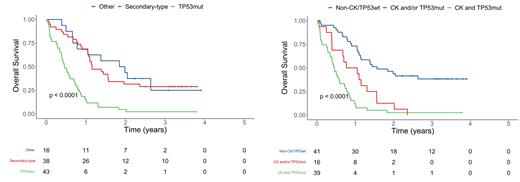Background: Recognizing the prognostic importance of genetic characteristics rather than clinical history, secondary acute myeloid leukemia (AML), i.e., arising from prior cytotoxic therapy and/or an antecedent hematologic disorder (AHD), is now considered a diagnostic qualifier rather than a separate disease entity (Döhner, Blood 2022). To assess the relationship between clinical history and/or adverse cytogenetics and outcome, we report herein the molecular profile of AML patients >60 years with secondary AML and/or adverse cytogenetics included in a multicentric prospective trial.
Methods: Fit patients >60 years with secondary AML and/or adverse cytogenetics according to the European LeukemiaNet, included in the Rev-5-Aza trial (NCT01301820), received induction therapy with lomustine 200 mg/m 2 day 1, idarubicin 8 mg/m 2 days 1-5, and cytarabine 100 mg/m 2 days 1-7. Patients in complete remission (CR) after one induction cycle received consolidation therapy with 12 cycles of alternating azacitidine 75 mg/m 2 days 1-7 and lenalidomide 10 mg days 1-21 every 28 days (Hunault-Berger M, Blood Cancer J 2017). Mutational profile was determined by targeted sequencing of complete coding regions, including splice sites, of 77 genes recurrently mutated in myeloid malignancies using custom SureSelect QXT capture system (Agilent, Santa Clara, CA, USA) on NextSeq500 platform (Illumina, San Diego, CA, USA). As a validation cohort, we determined the molecular profile of 73 patients with adverse cytogenetic risk and/or secondary AML in first CR after the same induction therapy but who received standard chemotherapy consolidation with 6 cycles of idarubicin 8 mg/m 2 day 1 and cytarabine 50 mg/m 2/12 hours days 1-5.
Results: Between March 2011 and February 2013, 117 fit patients >60 years included in the Rev-5-Aza trial received induction therapy with 56% reaching first CR and four patients undergoing allogeneic hematopoietic cell transplantation. The molecular profile could be established in 97 of these patients (83%; median age 70 years, interquartile range (IQR): 65-73; therapy-related AML, 32%; AHD, 46%; adverse cytogenetic risk, 70%). Secondary-type mutations were the most frequently observed (49%; ASXL1, 12%; BCOR, 16%; EZH2, 2%; RUNX1, 18%; SF3B1, 8%; SRSF2, 14%; STAG2, 10%; U2AF1, 8%; and ZRSR2, 0%) followed by TP53 mutations (44% of patients). Patients with TP53 mutations were more likely to have adverse risk cytogenetics (95%) in comparison to patients with secondary-type mutations (64%). No clinical or biological characteristic was associated with the achievement of CR (secondary-type mutations, 51%, TP53 mutation, 49%). Clinical history was not associated with overall survival (OS) as patients with therapy-related AML had the same outcome as other patients (hazard ratio [HR]=1.04, P=0.9) and patients with AHD had a more favorable outcome (HR=0.57, P=0.02). On the other hand, adverse cytogenetics was associated with decreased OS (HR=3.32, P<0.001). Whereas TP53 mutations were associated with decreased OS (HR=3.71, P<0.001), secondary-type mutations were not (HR=0.64, P=0.049; Figure A). After multivariable analysis, both complex karyotype (CK; HR=0.006, P=0.006) and TP53 mutations (HR=2.12, P=0.03) were independently associated with OS. Considering both CK and TP53 mutations identified three groups of patients with differential OS (median 1.57 vs. 0.91 vs. 0.45 years, P<0.001; Figure B). Similar results were observed in the validation cohort. Patients in first CR from both cohorts were then compared to identify molecular subgroups for which a lenalidomide/azacitidine consolidation was associated with improved OS in comparison to standard chemotherapy. No molecular subgroup had increased OS with lenalimomide/azaciditine consolidation while standard chemotherapy was associated with improved outcomes in patients with adverse risk cytogenetics.
Conclusion: Together, these data suggest that the clinical history contains limited prognostic value compared to genetics, supporting the most recent approach to use cytogenetic and molecular data to assess disease risk. In this patient population, complex karyotype and TP53 mutations, rather than secondary-type mutations, were associated with outcome.
Figure. (A) Overall survival according to secondary-type and TP53 mutations status. (B) Overall survival according to complex karyotype (CK) and T P53 mutation status.
Disclosures
Dumas:Servier: Honoraria, Other: Research support for institution; Novartis: Honoraria, Other: Research support for institution; BMS: Honoraria, Other: Research support for institution; Abbvie: Honoraria; Astellas: Honoraria, Other: Research support for institution; Jazz pharmaceutical: Honoraria; Daiichi-Sankyo: Honoraria, Other: Research support for institution; Janssen: Honoraria; Roche: Other: Research support for institution. Bertoli:BMS-Celgene: Honoraria; Abbvie: Honoraria, Other: Travel; Servier: Honoraria; Novartis: Honoraria; Jazz Pharmaceuticals: Honoraria, Other: Travel; Astellas: Honoraria. Pigneux:Gilead: Honoraria; Abbvie: Honoraria, Membership on an entity's Board of Directors or advisory committees, Other: Support for attending meetings; Servier: Honoraria, Membership on an entity's Board of Directors or advisory committees, Other: Support for attending meetings, Research Funding; Roche: Research Funding; BMS: Membership on an entity's Board of Directors or advisory committees, Research Funding; Astellas: Honoraria, Membership on an entity's Board of Directors or advisory committees, Research Funding; Jazz Pharmaceuticals: Honoraria, Membership on an entity's Board of Directors or advisory committees; Novartis: Honoraria; Pfizer: Membership on an entity's Board of Directors or advisory committees. Recher:Jazz Pharmaceuticals: Other: Personal fees, Research Funding; Novartis: Other: Personal fees; Astellas: Other: Personal fees; BMS: Other: Personal fees, Research Funding; Amgen: Research Funding; Abbvie: Honoraria; Servier: Other: Personal fees; MaatPharma: Research Funding; IQVIA: Research Funding; Takeda: Other: Personal fees. Mathilde:Novartis: Research Funding; Servier: Honoraria, Membership on an entity's Board of Directors or advisory committees; Incyte: Honoraria, Membership on an entity's Board of Directors or advisory committees; Clinigen: Honoraria, Membership on an entity's Board of Directors or advisory committees; Pfizer: Other: Support for attending meetings.


This feature is available to Subscribers Only
Sign In or Create an Account Close Modal